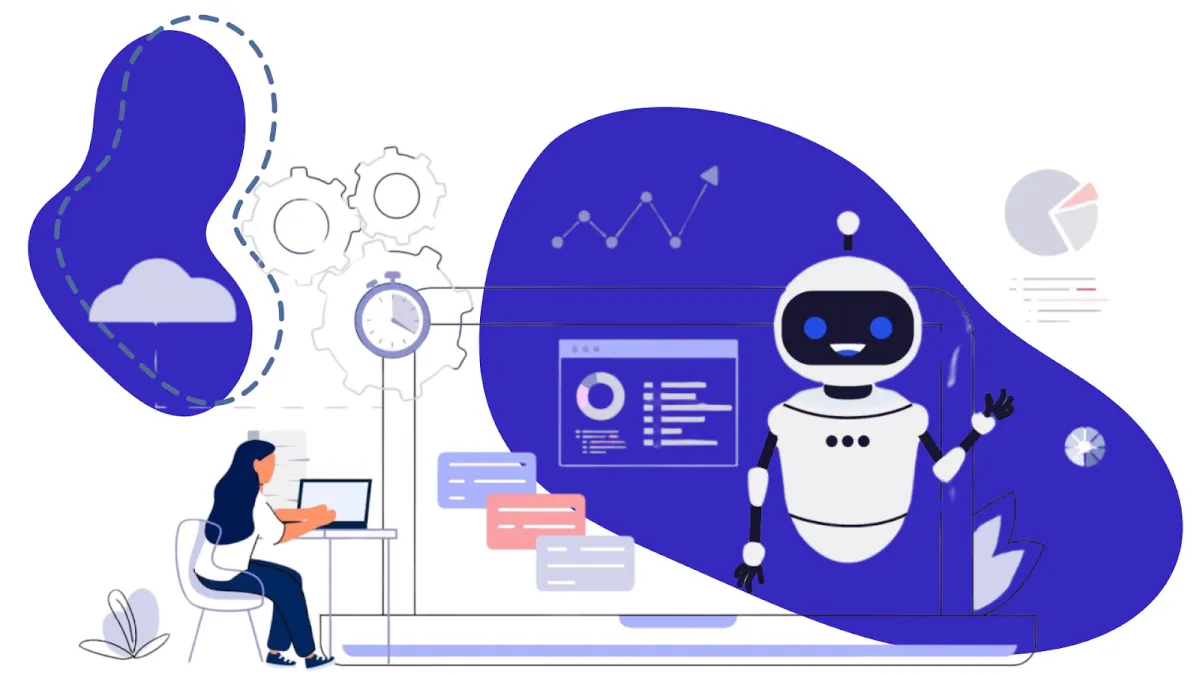Noodling with Intelligence
Stay Informed, Inspired, and Ahead in the World of Artificial Intelligence and Business

Noodling with Intelligence
Stay Informed, Inspired, and Ahead in the World of Artificial Intelligence and Business

How to Boost Your Small Business with AI Marketing?
People once said AI would take our jobs. But now, AI helps your business sell more!
Think of AI like a super intern. It works all day, every day, never takes breaks, and never complains.
Don't worry! AI won't replace you. It will just help you look smart!
Running a small business can feel overwhelming, like doing too many things at once. However, imagine having a smart helper who never sleeps and loves working with data.
That’s what AI marketing does for small businesses. It’s like having a digital marketing expert; without the long beard!
AI can handle boring tasks and even guess what your customers want before they do. It helps small business owners compete with bigger brands.
Are you ready to make tech your top marketing tool? Contact Manuj Aggarwal!
Understanding AI Marketing: Why Should Small Businesses Care?
Artificial Intelligence (AI) is no longer an alien concept limited only to science fiction. It’s transforming various industries in a flash, and marketing is no exception.
What Is AI Marketing?
AI marketing is the application of artificial intelligence to:
Automate and improve marketing processes
Analyze customer data
Personalize marketing campaigns
Drive better business outcomes
Using AI in marketing isn’t just a trend anymore. It helps brands grow awareness and boost sales. It’s now a key advantage over competitors.
A study revealed that,
AI adoption among small businesses leads to:
Increased Productivity (87%)
Business Effectiveness (86%)
Improved Growth (88%)
The Relevance of AI Marketing for Small Businesses
Big companies often have large budgets and special marketing teams to use advanced tools. But small businesses might think they can’t afford AI.
[Source: Grandview Research]
AI integration is becoming increasingly popular, as seen by the 77% of small businesses that have implemented AI in some way.
That being said, this is not at all true. AI marketing creates a level playing field by offering small firms the following potent capabilities:
Enhance Customer Understanding
Large volumes of consumer data can be analyzed by AI algorithms to find trends, preferences, and pain areas.
For instance, past purchases, social media activity, and website interactions. This profound comprehension enables small businesses to:
Personalize customer experiences
Identify target audiences more effectively
Improve Efficiency and Automation
AI tools can handle boring and time-consuming marketing tasks. This gives small business owners and their teams more time to focus on important work.
Examples include:
Automated email marketing
Social media management
Chatbots for customer support
Optimize Marketing Campaigns
Real-time AI analysis of marketing campaign performance can reveal important information about what is and is not working.
This enables small businesses to:
Optimize ad spending
Improve content performance
Make data-driven decisions
Gain a Competitive Edge
It is crucial to stand out from the throng in the current digital environment.
AI marketing can help businesses:
Deliver more relevant and engaging content
Provide high-quality customer service
Adapt quickly to market changes
Traditional Marketing vs. AI-Driven Marketing: A Comparison
Sounds interesting? Contact Manuj Aggarwal to get the best quality AI marketing solutions.
How Does AI Enhance Customer Engagement for Small Businesses?
Small businesses can now improve their customer interactions. This is possible because more AI tools are easy to obtain and affordable.
By utilizing AI, these companies may strengthen their relationships with their clients. This will boost client satisfaction and loyalty and eventually spur growth.
A study says,
Although AI is used in many company sectors, its most popular applications are in marketing (53%), sales (49%), and customer service (46%).
Personalizing the Customer Experience
AI is excellent at providing customized experiences, which are at the core of improved client engagement.
AI systems study large amounts of customer data, like browsing history, past purchases, preferences, and interactions.
They use this information to understand each person's needs and change how they respond. This personalization shows up in many different ways.
Such as:
Each consumer can receive highly relevant product or service recommendations via personalized recommendations.
Through the reduction of noise and the enhancement of customer involvement with marketing initiatives, targeted marketing guarantees that consumers receive information that is pertinent to them.
Based on each customer's unique profile, AI may modify dynamic material, such as emails, websites, and even in-app experiences.
Improving Engagement Through AI-Powered Tools
Along with customization, AI uses different technologies to help brands engage and interact with customers at every step of their journey.
Such as:
AI chatbots for instant support give 24/7 customer service. They answer common questions, fix simple issues, and guide customers through processes.
Proactive customer service helps companies connect with their customers by offering solutions and showing they care about their well-being.
Look at how customers interact at each step of their journey. This helps you find problems and spot ways to improve their experience.
You can use sentiment analysis to study customer reviews from different sources. For example, you can analyze social media, reviews, and support tickets to understand how customers feel. This helps you find out what your company is doing well and where it needs to improve.
Which AI Tools Are Essential for Small Business Marketing?
Small businesses often don’t have a large team or big budget. AI tools help them work with limited resources.
Here are some key ways small businesses can use AI to improve their marketing:
At A Glance: Top AI Tools for Small Business Marketing
AI-powered email optimization, audience segmentation, and automation
1. AI for Content Creation
Developing interesting and regular content is essential for drawing in and keeping clients. Small businesses can benefit from AI-powered content creation solutions in a variety of content formats:
Text Generation
There are AI tools that can help generate blog posts, social media posts, website copy, email drafts, and product descriptions based on user prompts. These AI tools are ChatGPT, Copy.ai, Jasper, and many more.
[Source: Jasper]
They also help with brainstorming ideas and outlining content!
Image and Video Creation
With the help of programs like Synthesia, Pika, and Hailuo, anyone may produce visually appealing graphics and videos with little to no design expertise. Platforms like Canva with its “Magic Design” function also play a great role in image and video creation.
[Source: Synthesia]
As a result, AI can automate video editing tasks or create pictures in response to text cues.
Content Optimization
By improving written material for clarity, grammar, tone, and SEO optimization, tools like GrammarlyGO, MarketMuse, and Surfer SEO. Make sure that the information is both search engine discoverable and interesting to readers.
[Source: SurferSEO]
2. AI for Search Engine Optimization (SEO)
Increasing online exposure is essential for small businesses to draw in organic visitors. AI-driven SEO solutions can be beneficial in many ways:
Keyword Research
AI-powered tools such as Ahrefs, Moz, and Semrush evaluate search traffic and competitiveness, find relevant phrases, and recommend similar terms to target.
[Source: Semrush]
Content Optimization for SEO
Some content production tools also have SEO optimization functions, as was previously discussed.
Furthermore, specialized SEO tools like Yoast SEO (for WordPress) and Surfer SEO offer AI-driven suggestions on how to effectively:
Structure the text
Enhance readability
Optimize it for particular keywords
Technical SEO Analysis
A website can be crawled by tools like Screaming Frog, which can then find technical SEO problems like:
Broken links
Duplicate content
Slow websites
[Source: Screamingfrog]
The analysis helps companies identify areas where AI-powered content optimization can be most successful, even though it is not entirely AI-driven.
3. AI for Customer Analysis
Effective marketing requires a thorough understanding of consumer preferences and behavior. Small firms can obtain important insights by analyzing client data with the aid of AI tools:
Customer Relationship Management (CRM) with AI
Businesses can find and target their most promising clients by utilizing AI capabilities like lead scoring, sales forecasting, and customer segmentation, which are integrated into platforms like HubSpot CRM and Zoho CRM.
Social Media Analysis
AI-powered analytics are available through tools like Sprout Social and Buffer to
Understand audience interaction
Spot patterns
Assess brand sentiment on social media
[Source: Sproutsocial]
Website Analytics with AI Insights
AI systems like PaveAI assist in converting complex data into meaningful insights about
Website traffic
User behavior
Conversion rates
They are used to improve platforms like Google Analytics.
AI Chatbots for Customer Interaction
Intercom, Drift, and Tidio are just a few examples of tools that use AI chatbots to
Answer consumer questions
Offer immediate assistance
Learn about their preferences and needs
How Can Small Businesses Implement AI in Their Marketing Strategy?
AI only needs a careful integration of particular tools and methodologies, not a radical change to your current approach.
One Study from SericeDirect revealed,
Overall, most small businesses (77%) have good responses about AI, with the most common sentiments being enthusiasm (19%) and confidence (24%). Uncertainty was the most frequently expressed negative emotion (12%).
Let’s see how small businesses can implement AI in their marketing strategy.
1. Define Your Marketing Goals and Identify AI Opportunities:
Clearly defining your existing marketing goals is essential before implementing any particular AI solutions.
What do you aim to accomplish?
Boost sales, enhance customer engagement, get more leads, or raise brand awareness?
Determine the areas where AI can have the biggest influence if your goals are established.
Think about the following:
Customer Understanding
Personalization
Efficiency
Data Analysis
2. Start Small and Focus on Specific Use Cases:
Don't attempt to apply AI to every aspect of your marketing at once. Start with a clear-cut, manageable use case where AI can be advantageous.
Among the points of entry for small enterprises are:
AI-powered Chatbots
Email Marketing Personalization
Social Media Management Tools
Content Creation Assistance
Predictive Analytics for Advertising
3. Choose the Right AI Tools and Platforms:
There are several AI-powered marketing products available to suit different budgets and needs. Look into and choose tools that fit your technical capabilities and use cases.
Think about things like:
Ease of Use
Integration Capabilities
Scalability
Cost-Effectiveness
4. Integrate AI Gradually into Your Existing Workflow:
Implementing AI should be done gradually. Don't completely abandon your successful tactics. Rather, determine how AI tools can support and improve your current endeavors.
For instance:
Use statistics driven by AI to improve the audience segmentation you currently have.
Use AI writing assistance to create content more quickly without sacrificing the tone of your brand.
Your human support staff may concentrate on more complicated problems by using AI chatbots to answer basic consumer questions.
5. Monitor, Analyze, and Iterate:
After you start using AI technologies, watch how they perform. Check the results and track key metrics based on your original goals.
Are your chatbots improving customer happiness and cutting down on response times?
Is your personalized email marketing causing an increase in open and click-through rates?
Is AI being used in your marketing campaigns to generate more leads at a lower cost?
What Are the Common Challenges and How to Overcome Them?
Personalized client experiences and improved campaign performance are just two of the many advantages that come with using artificial intelligence (AI) in marketing.
Adoption of this revolutionary technology is not without challenges, though. Successful AI integration into marketing plans requires an awareness of these typical problems and the proactive application of remedies.
Potential Obstacles in AI Marketing Adoption
Many key challenges can hamper the smooth integration and effective utilization of AI in marketing.
Cost of Implementation and Maintenance
High Initial Investment
Ongoing Maintenance and Updates
Need for Specialized Talent
Complexity and Integration Issues
Technical Complexity
Integration with Existing Systems
Data Silos and Compatibility
Data Privacy and Security Concerns
Handling Sensitive Customer Data
Risk of Data Breaches
Ethical Considerations
Strategies for Overcoming AI Adoption Barriers
Addressing these challenges needs a strategic and proactive approach.
Mitigating Cost Concerns
Simplifying Complexity and Integration
Addressing Data Privacy and Security
Future Outlook: What's Next for AI in Small Business Marketing?
The use of AI in small business marketing is expected to undergo even more significant changes in the future.
Personalized Customer Experiences at Scale
Hyper-personalization will become very important for small business marketing in the future.
AI tools will get better at studying large amounts of customer data, such as:
Social media interactions
Email engagement
Browsing history
Purchase trends.
This will allow small companies to:
Create content creation
Anticipate predictive customer journeys
Enhance customer experience
The Rise of Intelligent Automation
Automation has already made marketing tasks more efficient. But future advances in AI will bring a new era of smart automation. This means AI will not only handle tasks; it will also learn, adapt, and make smarter decisions.
They will:
Smarter marketing campaigns
Automated content curation and distribution
Intelligent analytics and reporting
Emerging Technologies and Accessibility
The future of AI in small business marketing will be further shaped by many new technologies:
Generative AI for content creation
Voice marketing and search optimization
AI-powered visual search
Final Words
So, in today’s market, using AI marketing for small businesses isn’t just an option; it’s a game-changer. With the right techniques, AI can automate your marketing efforts!
Manuj Aggarwal and his team specialize in guiding small businesses through the AI marketing journey! Whether you are just getting started or looking to scale smarter, their expertise ensures you are not just keeping up but staying ahead!
Ready to transform your marketing with AI?
So, partner with Manuj Aggarwal today and let your small business grow smarter, faster, and stronger!
FAQ: Boosting Small Businesses with AI Marketing
How can I include AI in my small business marketing strategy?
Identifying particular marketing chores or difficulties where AI could provide a solution and increase efficiency or effectiveness is the first step in incorporating AI into your small business marketing.
Can small businesses afford AI marketing tools?
It's true that a lot of AI marketing tools are becoming more and more accessible to small businesses, with many of them providing tiered pricing structures or budget-friendly solutions.
How does AI guarantee individualized client interactions?
By evaluating enormous volumes of consumer data to comprehend unique preferences and behaviors, AI guarantees individualized client experiences by providing customized interactions, offers, and content.
What dangers might artificial intelligence marketing pose, and how can they be avoided?
Careful data management, frequent algorithm audits, and an emphasis on enhancing rather than completely replacing human abilities can all help to reduce the risks associated with AI marketing, which include algorithmic bias, data privacy issues, and the possibility of job displacement.

